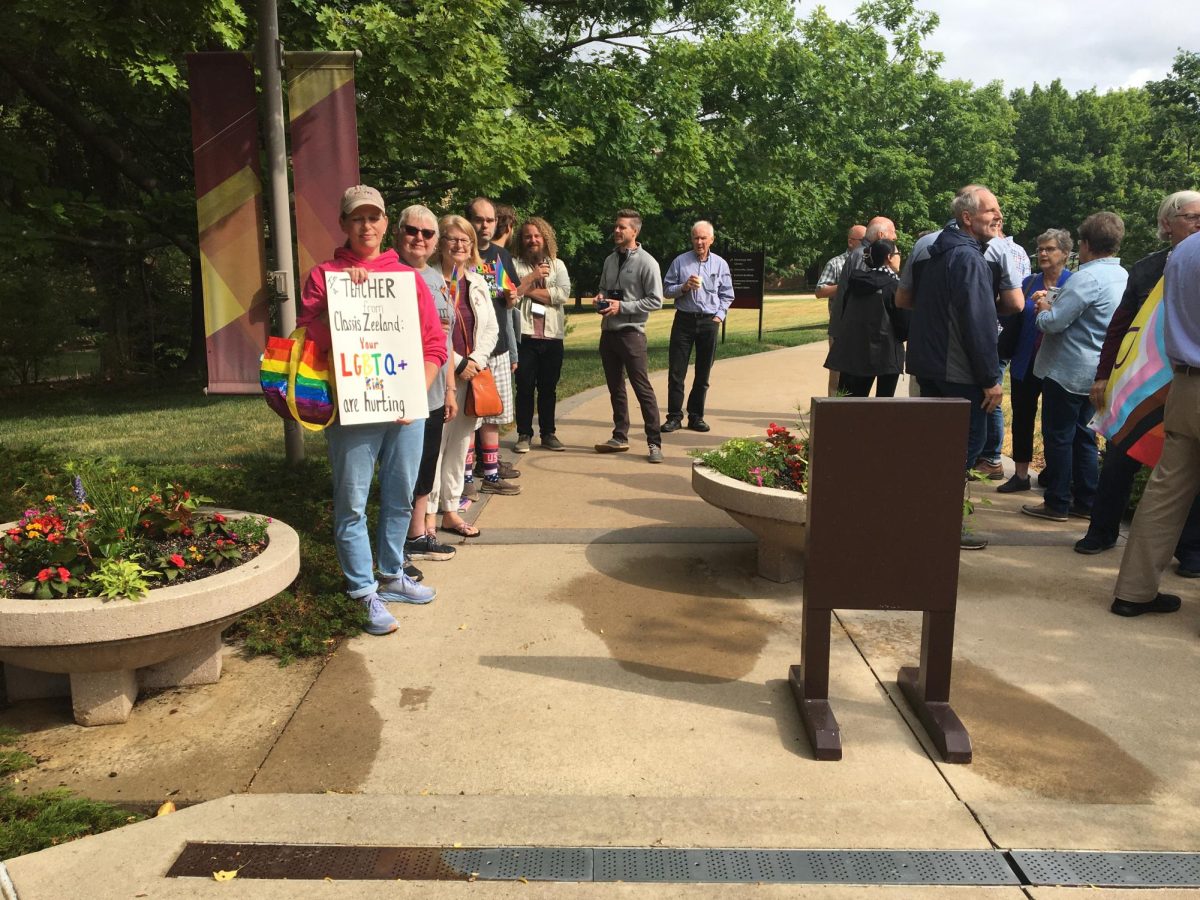Whether it’s the rich tones of the organ, the harmonies of a choir, or the familiar words of a liturgy spoken out over the congregation, worship can be an intensely hearing-focused experience for many people. However, what some people may consider typical worship may not be accessible to everyone. When she arrived at Calvin this fall, freshman Eleanor Plutz wondered: What about people who are deaf or hard of hearing?
Plutz, who herself is fully deaf in her right ear and has limited hearing on her right side, decided to start interpreting Friday chapels into American Sign Language (ASL) this year. So far, Plutz has interpreted into ASL at two Friday chapels, the most recent of which was Friday, Nov. 22. Chimes spoke with Plutz about interpreting at chapel. The following conversation has been edited for length and clarity.
Chimes: How do you manage your hearing difficulties differently at college versus when you’re at home?
Plutz: I was homeschooled, so it was easier when I was at home. I have interpreters in my classes, which is really cool, so I don’t worry about missing anything or, like, listening fatigue, but social situations are kind of hard.
Chimes: Was it more difficult for you when you were younger, or now would you say?
Plutz: When I was younger, my hearing was better, which is kind of an interesting situation. I progressively lost my hearing from being, like, sick a bunch, so it was different. It was super mild, but that wasn’t really a skill I used until I was older. My hearing got worse.
Chimes: What would you say your hearing was like when you were born or first communicating?
Plutz: It was normal. Completely normal.
Chimes: Are there any positive aspects that you’ve come to enjoy about it?
Plutz: Yes, definitely, deaf culture. I wouldn’t have known about it if I hadn’t been kind of forced. It’s a really beautiful culture once you learn more about it Also a beautiful language. If my hearing hadn’t gone worse,I probably wouldn’t have that passion for the deaf community or deaf ministry.
Chimes: How did you decide to come to Calvin, and how’d you know that they would be able to meet your needs?
Plutz: I was looking for a Christian school and the community here I really like. I just like the vibe. I wasn’t sure if they were able to do interpreters because it’s usually a fight, but they were surprising with that. I was expecting that they would give me a note taker and say I’m fine. It was a nice surprise
Chimes: What are some lessons or tips you’ve learned along the way to help you understand and communicate with others?
Plutz: There’s a lot of non-verbal communication that we do, which is why sign language is great because I think anyone can benefit from non-verbal communication.
Plutz: I’m in the MLC, so the ministry leadership cohort. I just sign whenever I worship because I feel like it’s more of my language. Someone in my cohort asked me if I would want to join the chapel team to sign, and I said sure. It wasn’t really something I planned on or expected.
Chimes: Are there any areas in which you help others by providing acting as a sign interpreter?
Plutz: I’ve kind of makeshift interpreted a few times. I wouldn’t say I’m good at it, because it takes so much energy on my part. But I can try my best, It’s better than nothing.
Chimes: What is the most common misunderstanding about people who are deaf and hard of hearing?
Plutz: That they don’t want to be deaf or hard of hearing. Being a part of deaf culture is a positive thing. We don’t like using the term “loss” but instead use the term “deaf gain” because of areas of deaf culture that they appreciate and they wouldn’t change it. It’s a community with a rich history, culture and language. Most deaf people wouldn’t change it.
Chimes: What is one thing you would like people to know about you or the deaf community?
Plutz: Don’t be afraid to talk to us. If there’s a person that doesn’t verbally speak, you can write things down and they’ll usually converse that way, by writing things down to each other.






